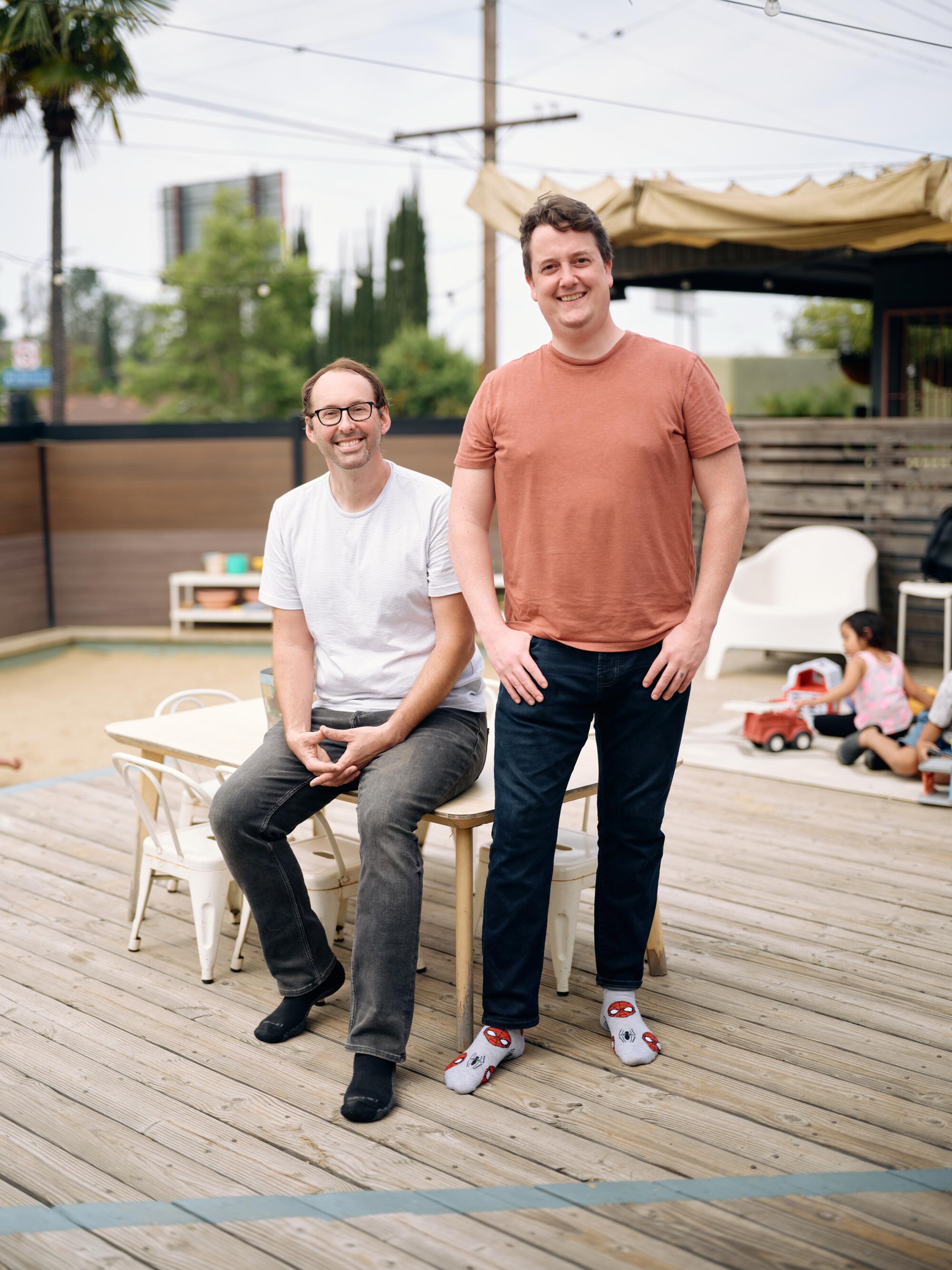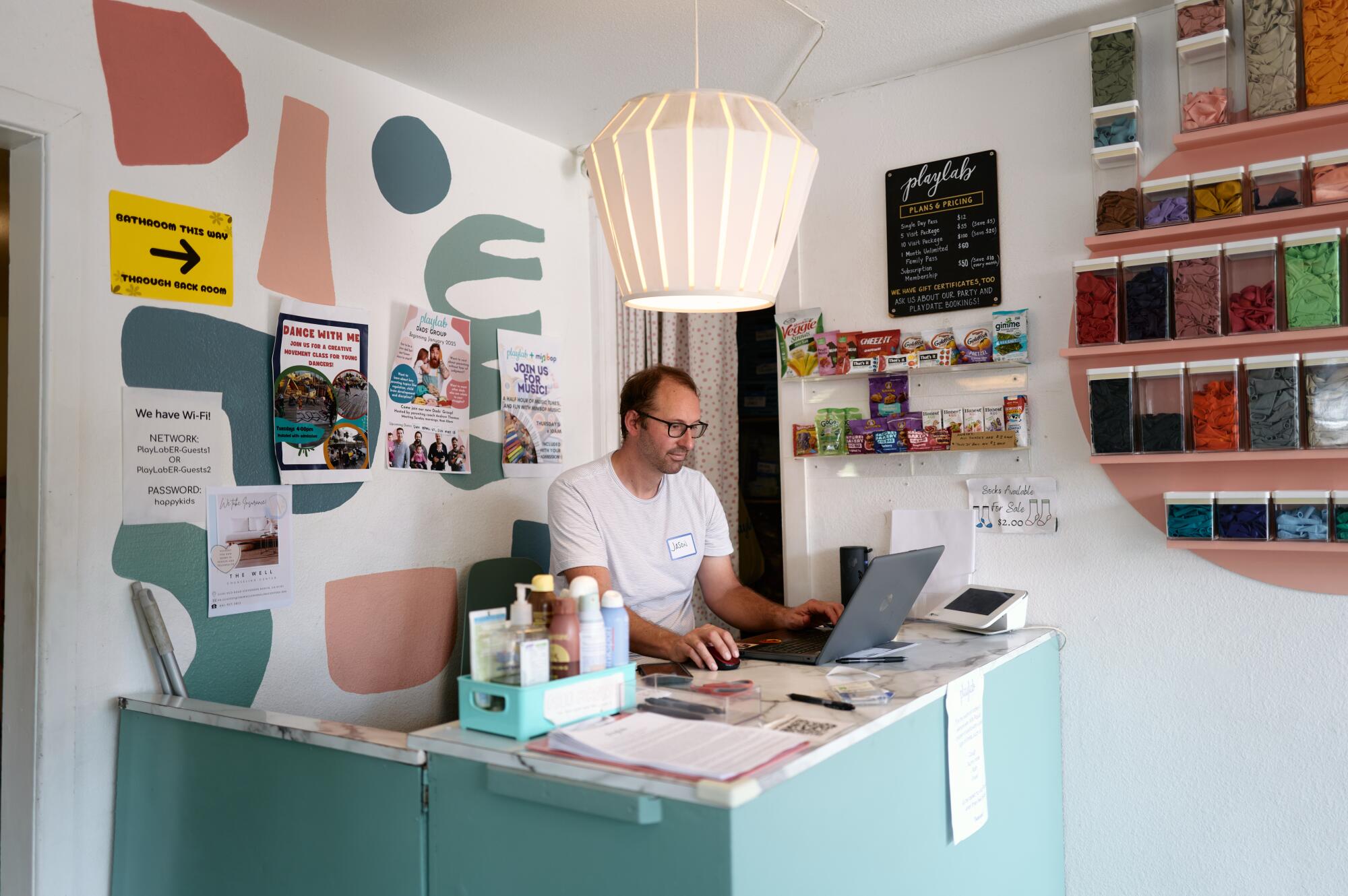In the back room of a children’s play space in Eagle Rock, Andrew Thomas asks a familiar parenting question: How do you stay calm when your kid is testing every last nerve?
Heads nod and chuckles fill the air. The participants — a handful of dads — begin sharing personal stories about toddlers that melt down like snow on summer asphalt, frayed patience and what it means to parent with intention. The conversation deepens, touching on masculinity and how hard it could be to ask for help.
Suddenly, Henry, 6, walks into the dads’ circle, cradling three baby dolls. Thomas, his dad and the group’s facilitator, does not miss a beat.
“Henry has very recently become a father to triplets,” he jokes.
Phil Klain and Robert Tellez during a Dads’ Group meeting.
(Marcus Ubungen / For The Times)
At the Dads’ Group in Eagle Rock’s PlayLab, children and dolls are welcome, but dads and father figures take center stage. The free biweekly morning sessions are built around a simple idea: Dads need community too. The hour-long meetings bring the community support model back to parenting — especially for dads, an often-forgotten population for supportive care.
In Los Angeles, support groups exist to help moms move their bodies around strollers while blowing bubbles, and tour fire stations with the kids while fostering connections with other caregivers. Fewer opportunities exist for dads even as gender roles continue to evolve and men spend more time on the care of their children.
PlayLab’s Dads’ Group hopes to soften some of those sharp edges of fatherhood. Sessions are casual and small — usually with four to eight participants — and operate on a drop-in basis (though reservations are preferred). It’s a dad-led model for dads and father figures to receive the kind of care traditionally offered to mothers.
The bonus is the space: PlayLab’s indoor play space is designed for young children to frolic and, in this case, witness dads build their emotional muscles. Here, vulnerability is welcome and the chance of an interruption from a child asking for a third snack is high.
In this meeting on a warm June morning, Leo, 5, wanders off to play the drums in the next room. Then he falls silent. His dad, Andrew Jacobs, quietly slides out of his seat in the support circle to check on his son. Leo is tucking an elephant stuffed animal into a toy bed. It’s nap time for the dolls and the elephant, and it turns out for dad talk too. The children ask for quiet. Voices drop to a whisper.
The next minute, the dads toggle their attention between the discussion and an impromptu game of catch between the kids and a heavy toy.
“Dads are going through all the same things moms are going through,” said Jacobs, 44. “Being able to talk to other people is really important and helpful.”

Nick Bender shares parenting tips with other dads in a discussion facilitated by Andrew Thomas, right, while Henry, 6, plays.
(Marcus Ubungen / For The Times)
This meeting was Phil Klain’s first. He chose not to bring his 2-year-old son so he could be more present. Klain has been searching for a community like this. Earlier in his fatherhood journey, he joined a new dads’ group on social media, but found the space difficult to form connections — a challenge that sometimes seeps into real life.
“I’ve got friends I can talk about stuff with,” said Klain, 45, after the meeting. “But, do I?”
Modern parenting can be isolating — now more intense and more individualistic than ever with hyper-scheduled monitoring of children’s every milestone and moment. Sociologists call it “concerted cultivation,” said Jennifer Hook, a professor of sociology at the University of Southern California.
“Our expectations of parents have gone up, but we haven’t really provided them additional resources,” said Hook.
At the same time, connections to supportive systems — the “village” of friends and family that helps raise children — have faded or become untenable. PlayLab’s ethos, said co-founder Jason Shoup, has always focused on the growth of the village’s connective tissue — especially for dads. When PlayLab’s new space in Hollywood opens this month, he hopes to launch a second version of the dads’ group in the new location.

Playlab co-founder Jason Shoup, left, with Andrew Thomas, a parent coach and children’s television writer who facilitates the Dads’ Group.
(Marcus Ubungen / For The Times)
“If you’re part of a team,” said Shoup, 45, about parenting, “you should support the team.”
Shoup’s earlier iterations of a dads’ support group — including a sporadic weekend gathering called “Dadder-day” — all fizzled. Then last winter, Thomas, 39, a children’s television writer and a parent coach, pitched his services. Why not start a group for dads by dads?
They kept the name simple: Dads’ Group. A necessity, said Thomas, because otherwise, dads won’t know the group is for them. In January, the meeting of the dads began.
Robert Tellez, 42, has attended most of the sessions. Before the first one, he anticipated a lot of silence.
“Like, crickets, right?” said the dad of two daughters. “And just awkwardness.”
Instead, he found a space that felt surprisingly safe.
“I didn’t know what I needed and how it felt. And so now that I’ve put myself into the situation of being a part of a dads’ group – participating, and being vulnerable, and giving advice, and taking advice – I know what that feels like now,” said Tellez.
If the rest of the week is a high-octane rush of services for the children, these Sunday sessions are a reserve time for some of the dads to just be present.
In little moments, connections form. While shoes are being put back on, dads trade birthday party venue recommendations. Talk is also burgeoning about going to a nearby deli together after the meeting for lunch.
Main character energy

Jason Shoup works on a computer at the front desk of the colorful PlayLab.
(Marcus Ubungen / For The Times)
In a traditional parenting binary, the mom is often labeled the default parent. Dads? They are cast in supporting roles.
“Like the stereotype of the dad ‘babysitting’ his kid, right?” said Shawna J. Lee, a professor of social work at the University of Michigan. “It’s a very vexing phenomenon.”
Especially since fathers today are increasingly tackling more diverse childcare tasks like sculpting the perfect hair bun for a child’s ballet class or packing roasted broccolini in a school lunch.
“We, as a society, don’t do a great job of treating dads as equals,” said Lee. “I don’t know that every single mom out there is optimally well-prepared to parent any more than a dad is. It’s a little bit of a sink or swim, maybe for all of us, to some degree.”
If dads are continually being sidelined into secondary roles, added Lee, then they never get the chance to become experts in their parenting and in their parent-child relationship.
Because of these lingering gender norms, the barrier for dads to seek support can be high. Nick Bender, 39, saw the poster for Dads’ Group several times during visits to PlayLab with his 4-year-old daughter. It took a while to work up the nerve to go.
“I didn’t know any of the other dads,” he said. “So, you know, it’s obviously nerve-racking to go into any new situation and, let alone, prepare to potentially be vulnerable about our lives.”
Now after each meeting, Bender feels seen. Last month, Thomas had to cancel a meeting at the last minute because of a family emergency. Bender didn’t get the message, so he showed up anyway and ended up chatting with some other dads for an hour.
Solo time is precious, he said with a laugh at the end of the meeting.
So is connection time.
Frank Lopez, 29, meant to bring his partner’s kids to attend the dads’ group, but he misread the start time. He missed the meeting, but the kids — a 4-year-old girl and a 6-year-old boy — still got to play in the sandbox. Lopez is new to fathering. He recently moved in with the kids and their mother. Today is a milestone: his first solo outing with the children.
“It feels great, honestly, one for her trusting me to do so,” he said about his partner. “And then to the kids for cooperating. They’re usually like, ‘Where’s mommy? I want mommy.’ But now they like — wow — have that trust to just come with me.”
Lopez pauses and watches the kids fill a bucket with sand.
“I just want to make sure that I’m a good example,” he added.
He’s already planning to come back.
“And I’ll be on time next time.”
